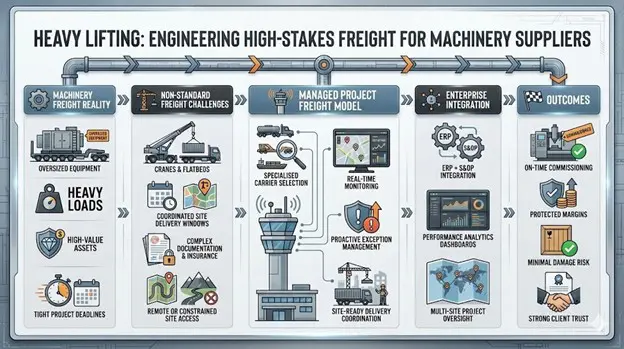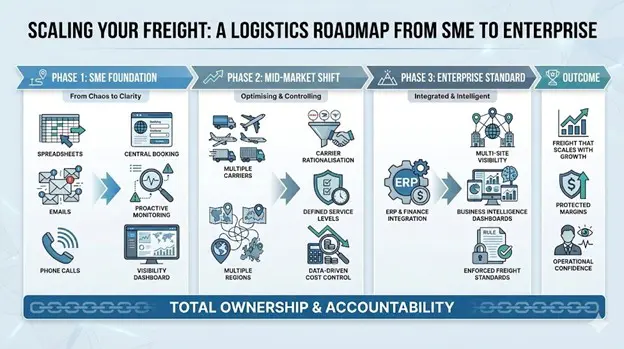In today’s complex logistics landscape, a Freight Management System (FMS) is a game-changer. Designed to streamline, optimise, and enhance freight operations, an FMS helps businesses improve delivery efficiency, reduce waste, and increase visibility across the supply chain. From freight brokers to large-scale shipping operations, this tool provides the automation and insights needed to thrive in modern logistics.
Key Functions of a Freight Management System
- Shipment Planning and Optimisation
An FMS ensures shipments are planned efficiently by consolidating loads, selecting optimal routes, and choosing the right transport modes—whether by road, rail, air, or sea. This minimises unnecessary trips and maximises resource utilisation. - Carrier Selection and Management
With an FMS, businesses can compare carriers based on reliability, performance, and delivery times. This ensures the best fit for operational needs, fostering strong relationships with trusted partners. - Real-Time Tracking
Real-time shipment tracking provides end-to-end visibility, allowing businesses to anticipate delays, address issues proactively, and keep customers informed with accurate updates. - Minimising Waste
An FMS supports sustainability by optimising freight utilisation, reducing empty runs, and cutting fuel consumption. It also promotes eco-friendly packaging practices, aligning with environmental goals. - Documentation and Compliance
Freight management systems handle shipping paperwork, such as bills of lading and customs declarations, ensuring regulatory compliance and avoiding costly delays or penalties. - Analytics and Reporting
Integrated analytics tools provide insights into shipping performance, operational efficiency, and environmental impact. These data-driven insights help businesses refine strategies and monitor key performance indicators (KPIs).
Freight Management System vs. Transport Management System
While Freight Management Systems (FMS) and Transport Management Systems (TMS) are often used interchangeably, they serve distinct purposes:
- Freight Management System (FMS): Focuses on freight-specific tasks like shipment planning, carrier selection, and real-time tracking. Ideal for businesses managing goods movement across suppliers, warehouses, and customers.
- Transport Management System (TMS): Covers broader transportation operations, including fleet management, vehicle scheduling, and route optimisation. Best for organisations owning and managing vehicle fleets.
Businesses often benefit from integrating both systems, creating a comprehensive logistics solution.
Benefits of a Freight Management System
- Improved Efficiency
Automating tasks like scheduling, tracking, and reporting allows teams to focus on strategic decisions and reduces operational errors. - Minimised Waste
An FMS optimises routes, reduces underutilised freight space, and supports eco-friendly practices, benefiting both the environment and operational costs. - Enhanced Customer Satisfaction
Real-time tracking and timely updates ensure reliable deliveries, meeting customer expectations and building trust. - Scalability
As businesses grow, an FMS adapts to handle increased shipment volumes and diversified operations without compromising service quality. - Data-Driven Decision-Making
Comprehensive analytics help identify bottlenecks, monitor performance, and refine strategies to enhance supply chain efficiency.
The Importance of Freight Management Systems in Modern Logistics
In a globalised and competitive market, efficient freight management is crucial. An FMS simplifies complex supply chain processes, improves transparency, and reduces environmental impact. By minimising waste and adopting sustainable practices, businesses can meet both operational and environmental goals.
For companies navigating cross-border operations or managing large networks, an FMS is a critical tool to remain agile, competitive, and sustainable.
Conclusion
A Freight Management System is an indispensable asset for businesses seeking to master modern logistics challenges. From improving operational efficiency to enhancing customer experiences, an FMS supports scalability, sustainability, and strategic growth.
Adopting an FMS ensures your business is equipped to meet the demands of today’s fast-paced logistics environment while staying ahead of the competition.




